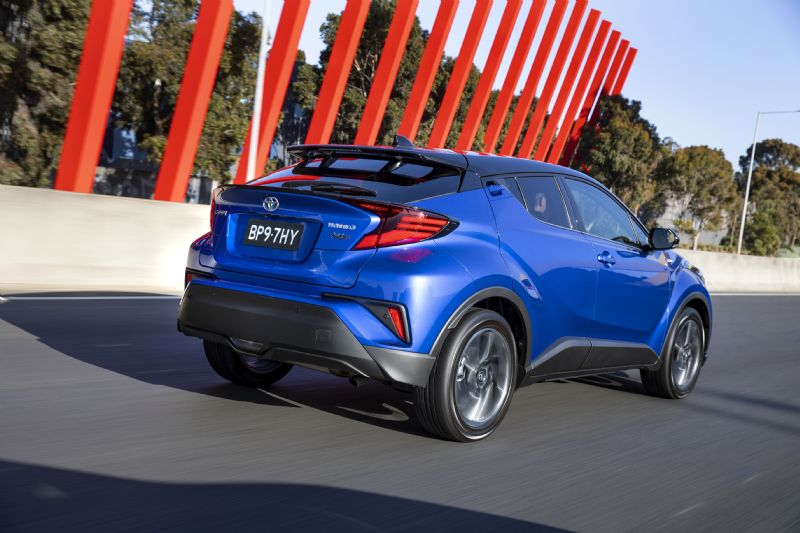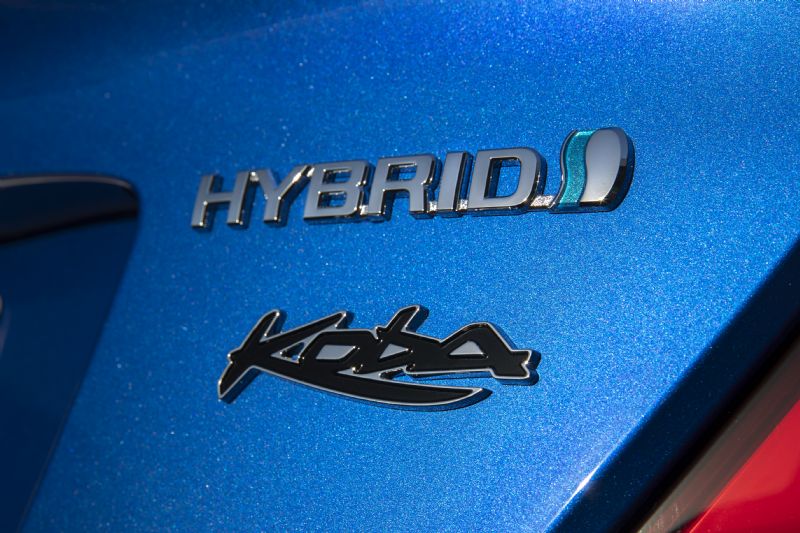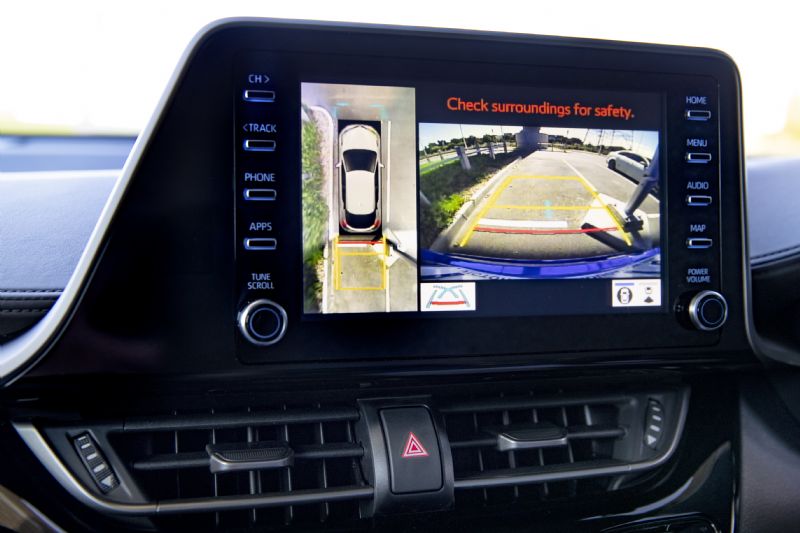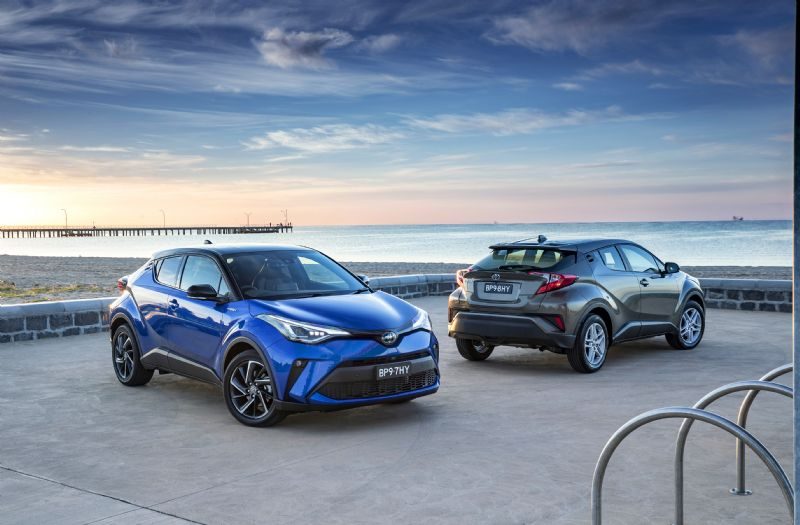IN LINE WITH ITS STATED AIM of offering hybrid variants of almost all its models, Toyota has expanded the appeal of its C-HR SUV by introducing hybrid-electric technology, refining its eye-catching design and installing a new-generation multimedia system with smartphone mirroring.
C-HR is the eighth Toyota model in Australia to offer a hybrid-electric powertrain, joining Camry, Corolla hatch and sedan, RAV4 and the Prius, Prius c and Prius v.
Available on the best-selling front-drive high-grade Koba variants, the 1.8-litre hybrid-electric system offers strong performance with combined output of 90kW and high efficiency with fuel consumption of just 4.3 litres/100km.
Other models in the range are powered by a punchy 1.2-litre turbocharged direct-injection petrol engine that is noted for its low-end torque and quick response.

Detailed attention to C-HR’s bold front and rear styling includes new LED headlights and taillights (Koba only) and new-design alloy wheels – 17-inch for C-HR and 18-inch for Koba.
These refinements build on C-HR’s strength and unique style with a coupe-like cabin, powerful lower body, raised ground clearance and muscular wheel arches.
C-HR’s premium cabin quality has been enhanced with a new multimedia system that incorporates an 8-inch touchscreen display (previously 6.1-inch) and full smartphone integration including Apple CarPlay and Android Auto.
Price increases have been contained below two percent, starting at $29,540 (plus on road costs) for the two-wheel drive 1.2-litre turbo C-HR with a continuously variable transmission.
High-grade Koba petrol starts at $33,940. The hybrid-electric system, including an electric vehicle mode, is an additional $2,500 (it’s a $1500 premium in the Corolla models).
The traction of Toyota’s part-time Dynamic Torque Control all-wheel-drive system adds just $2000 to the cost of the 2WD Koba.
Toyota Australia Vice President Sales and Marketing Sean Hanley said C-HR had achieved higher sales this year, challenging the market trend, due to its ability to attract new customers to the Toyota brand.

“We are expanding the C-HR range with Toyota’s hybrid-electric technology because it is an increasingly popular choice among consumers due to its strong performance, great fuel economy and proven reliability,” Mr Hanley said.
“Design and feature upgrades will add even greater appeal from C-HR’s stunning design that brings together the best aspects of a hatchback, a coupe and an SUV along with its driver-focused cockpit and premium interior.”
Mr Hanley said at least 90 percent of all electrified vehicles on Australian roads have a Toyota badge.
“It took almost 18 years – until April this year – for Toyota to sell a total of 100,000 hybrid-electric vehicles in Australia.”
“Yet, this year alone, we will sell around 25,000 hybrid-electric vehicles, or close to 15 percent of our total sales.”
“Hybrid demand is running at close to 40 percent for Corolla and RAV4, and above 50 percent for Camry. We anticipate similar success for the new C-HR hybrid.”
Clearly, those numbers are affected by the number of hybrid Camrys sold as cabs – we suspect the percentage sold to private buyers would be quite a bit lower – but with such a small premium, it’s reasonable to assume more private buyers will be choosing hybrid variants over time.

Advanced Toyota Safety Sense technologies are standard on C-HR: pre-collision safety system with day and night pedestrian detection, all-speed active cruise control, lane departure alert with steering assist and auto high beam.
Safety features extend to seven airbags, a reversing camera, blind-spot monitor, rear cross-traffic alert, rain-sensing wipers, front and rear parking sensors, hill-start assist control, and stability and traction control.
In-demand equipment fitted to every C-HR includes satellite navigation, dual-zone climate control, alloy wheels, 4.2-inch multi-information display, electronic park brake and auto-dimming rear-view mirror.
Luxury touches abound in the top-of-the-range Koba variants, including leather-accented seats, keyless smart entry and start, new-design 18-inch alloy wheels, LED lights and innovative nanoe (pronounced nano-e) technology that moisturises cabin air. These high-grade features add $4400 to the price of the standard 2WD C-HR.
C-HR’s vibrant exterior colour palette gains a new red mica-metallic paint. The extroverted styling of the C-HR is accentuated on Koba grades with a $450 two-tone paint option, matching a black or silver roof to specific body colours.
Buyers can personalise their C-HRs with a wide range of Toyota Genuine Accessories, including multiple alloy-wheel designs, wheel caps, mirror covers, coloured garnishes and roof crossbars for bicycles and other sports equipment.
C-HR comes standard with five years of Toyota Service Advantage with annual services capped at $195 each and is covered by a full five-year Toyota Warranty Advantage.
Toyota C-HR pricing
| C-HR 2WD petrol CVT | $29,540 |
| C-HR AWD petrol CVT | $31,540 |
| Koba 2WD petrol CVT | $33,940 |
| Koba AWD petrol CVT | $35,940 |
| Koba 2WD hybrid CVT | $36,440 |
Options:
Premium paint (all grades): $550
Two-tone paint (Koba): $450
Once we have tested and assessed the new Toyota C-HR, seniordriveraus will bring you a comprehensive review, including everything the over-50 driver needs to know.
